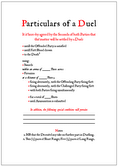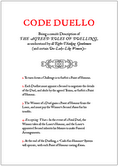Like A Velvet Glove
| Like A Velvet Glove | |
|---|---|

| |
| Designer: | Ben Henley (with help and grievances by Holly Gramazio; additional grievances by Kevan Davis, Baron Sarll and Ed Jefferson) |
| Year: | unknown |
| Players: | 8 |
| Stuff required: | Nerf guns, foam swords, wigs, play money, laurels/sashes |
| Crew required: | One. |
| Preparation: | Ten minutes. |
| Time required: | 45 minutes |
| Place required: | A baroque mansion or windswept moor |
| Activities: | Duelling, treachery |
| This is a playable game - it's finished, tested and ready to play. | |
| This game is made available under an Attribution-Noncommercial Creative Commons licence. (What does this mean?) | |
The players are 18th century gentlemen and ladies who have decided to settle their grudges through a series of duels.
Setting up
Each player starts with three sashes denoting their level of personal honour, and £500 in play money.
Players should have wigs or tricorn hats, and a selection of matched Nerf/foam duelling weapons should be available.
Sequence of play
The moderator picks the names of offended parties out of a hat.
It is up to the offended party to choose who to challenge and announce their grievance (made up or chosen from the list below).
After each duel, the two combatants must lie low, so they cannot duel in the next round. They may, however, act as seconds. If someone's name is picked and they are lying low, discard the name and pick again.
If you have no honour, you may not challenge.
A duel
The challenged party picks a second from among the players, then the challenger does likewise.
The duellists have a minute to brief their seconds.
The seconds then have three minutes to negotiate the terms of the duel:
- Which weapons are to be used (not necessarily the same on each side) - Nerf/foam weapons only
- The number of paces which will separate the parties, or the area of swordplay.
- Whether combat will be simultaneous or involve turns.
- Any compensation that will be paid to avoid a challenge.
- Any other conditions decided by the seconds, e.g. blindfolding of one or both parties
The first hit (sword or pistol) on an opponent is considered a wound.
If the duel proceeds to a second hit, the loser is killed and is out of the game.
The seconds have authority to negotiate the terms of the duel, subject to the moderator's final rulings. A duellist who refuses to duel on the agreed terms loses a point of honour (which is discarded, not awarded to their opponent).
Scoring
After a non-fatal duel, the winner takes one honour from the loser, and the winner's second gets £100 for their trouble from the loser.
After a fatal duel, the winner takes all the loser's honour, and the deceased party's second inherits all their money.
Betting
Betting on the outcome of a duel is encouraged - it is down to the players to agree odds and enforce payment.
Goal
At the end of the allotted time, money buys honour at the rate of £200 to one sash. The winner is the player who has the most honour.
Props list
- Hats/wigs
- Foam swords
- Name stickers and the same names on slips of paper
- Sashes
- Nerf guns & ammo
- Top hat suitable for drawing names out of
- Duel agreement forms
- Money
- Player briefings
Handouts
Design & layout by Natalie Catchpole
- Duel agreement form
- Rules handout
Grievances
If players can't think of a suitable grievance, they can draw from the following list.
I demand satisfaction over the matter of:
- spreading rumours that I indulge in vingt quatre
- posing with a theodolite
- contractum trinius
- gross and repeated villandry
- leaving my sister in an interesting condition in Ostend
- waltzing counterclockwise
- Lord Coryat's muff
- introducing the use of the fork to Wales
- teaching my niece to play Ruff and Trump
- promenading in brown gloves
- my love for the late Emperor
- poaching my head cook
- claiming outlandish expenses from parliament
- cheating in my hedge maze
- that scandalous article in the Mail
- ludicrous barony
- la promenade gauche

